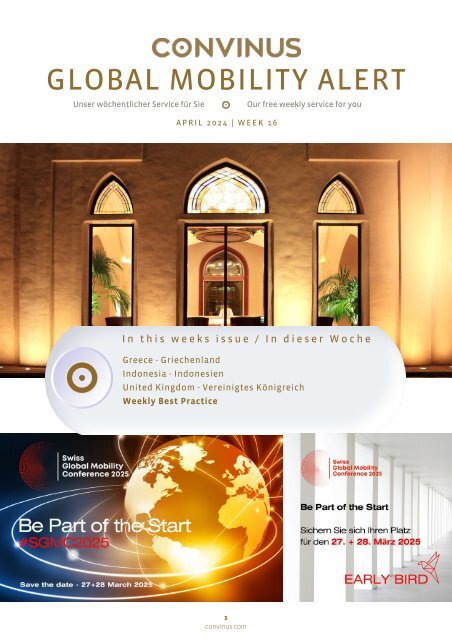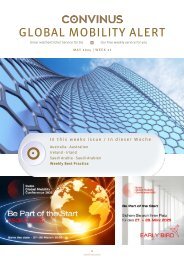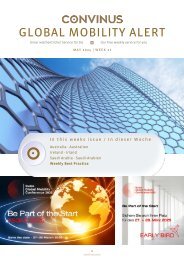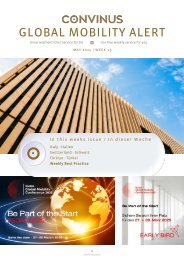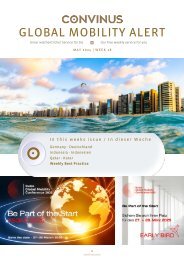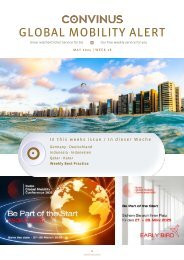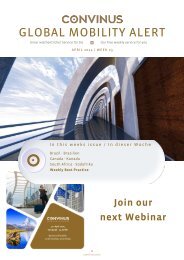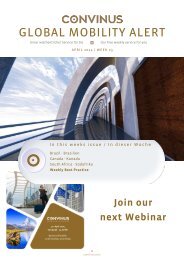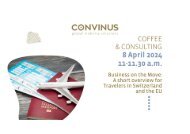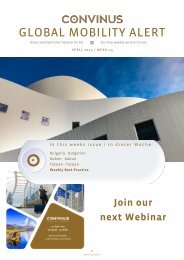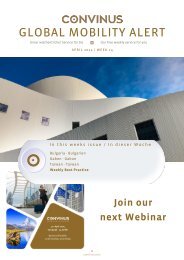Create successful ePaper yourself
Turn your PDF publications into a flip-book with our unique Google optimized e-Paper software.
GLOBAL MOBILITY ALERT<br />
Unser wöchentlicher Service für Sie Our free weekly service for you<br />
A P R I L 2 0 2 4 | W E E K 1 6<br />
I n t h i s w e e k s i s s u e / I n d i e s e r W o c h e<br />
Greece - Griechenland<br />
Indonesia - Indonesien<br />
United Kingdom - Vereinigtes Königreich<br />
<strong>Week</strong>ly Best Practice<br />
1<br />
convinus.com
NEWS UPDATE APRIL 18,2024<br />
Greece: Relaxed EU Blue Card rules implemented; EU ICT pre-screening introduced<br />
Griechenland: Gelockerte EU-Blue-Card-Regeln wurden umgesetzt; EU ICT Pre Screening<br />
eingeführt<br />
As of March 8, 2024, Greece has relaxed the application<br />
procedure for the EU Blue Card and at the same time<br />
introduced restrictions for the "pre-screening" for the<br />
EU ICT permit.<br />
As a result, foreign nationals residing in Greece<br />
without a visa or with a short-stay visa ("C visa")<br />
can now apply for an EU Blue Card, while all<br />
applicants for an EU Blue Card only need to prove<br />
that the duration of their employment contract is<br />
at least six months<br />
However, applications for an EU ICT permit will<br />
now be subject to a preliminary check before<br />
being forwarded to the relevant Greek consular<br />
post for processing - a procedure that is likely to<br />
extend the processing time by up to 40 days<br />
These changes could increase the acceptance of<br />
the EU Blue Card in Greece, while conversely the<br />
attractiveness of the EU ICT permit is likely to<br />
decrease.<br />
2<br />
convinus.com<br />
Zum 8. März 2024 hat Griechenland das Antragsverfahren<br />
für die Blaue Karte EU gelockert und gleichzeitig<br />
Beschränkungen für das "Pre-Screening" für die ICT-<br />
Genehmigung EU eingeführt.<br />
Infolgedessen können ausländische Staatsangehörige,<br />
die sich in Griechenland ohne Visum oder<br />
mit einem Visum für einen kurzfristigen Aufenthalt<br />
("C-Visum") aufhalten, nun eine Blaue Karte EU<br />
beantragen, während alle Antragsteller für eine<br />
Blaue Karte EU nur noch nachweisen müssen, dass<br />
die Dauer ihres Arbeitsvertrags mindestens sechs<br />
Monate beträgt<br />
Allerdings werden die Anträge auf Erteilung einer<br />
ICT-Genehmigung der EU nun einer Vorprüfung<br />
unterzogen, bevor sie zur Bearbeitung an die zuständige<br />
griechische konsularische Vertretung<br />
weitergeleitet werden - ein Verfahren, das die<br />
Bearbeitungszeit um voraussichtlich bis zu 40 Tage<br />
verlängern kann<br />
Diese Änderungen könnten die Akzeptanz der<br />
Blauen Karte EU in Griechenland erhöhen, während<br />
umgekehrt die Attraktivität der IKT-Genehmigung<br />
EU vermutlich abnehmen wird.
NEWS UPDATE APRIL 18,2024<br />
Indonesia: Remote worker visa implemented<br />
Indonesien: Remote Worker Visum eingeführt<br />
Effective April 1, 2024, the Indonesian government has<br />
introduced the Remote Worker Visa (E33G) program.<br />
With this visa, eligible foreign nationals can stay in<br />
Indonesia and work for their employer abroad for<br />
a period of up to one year (with the possibility of<br />
extension for another year)<br />
The requirements for obtaining the visa include<br />
being employed by a foreign company outside<br />
Indonesia, earning a minimum annual income of at<br />
least USD 60,000 and providing proof of sufficient<br />
financial resources.<br />
3<br />
convinus.com<br />
Am Mit Wirkung zum 1. April 2024 hat die indonesische<br />
Regierung das «Remote Worker Visa» (E33G) Programm<br />
eingeführt.<br />
Mit diesem Visum können sich berechtigte ausländische<br />
Staatsangehörige in Indonesien aufhalten<br />
und für einen Zeitraum von bis zu einem Jahr<br />
(mit der Möglichkeit der Verlängerung um ein<br />
weiteres Jahr) für ihren Arbeitgeber im Ausland<br />
arbeiten<br />
Zu den Voraussetzungen für die Erteilung des<br />
Visums gehört unter anderem, dass man bei einem<br />
ausländischen Unternehmen ausserhalb Indonesiens<br />
beschäftigt ist, ein jährliches Mindesteinkommen<br />
von mindestens 60’000 USD erzielt und<br />
einen Nachweis über ausreichende finanzielle<br />
Mittel vorlegt.
NEWS UPDATE APRIL 18,2024<br />
United Kingdom: The Ministry of the Interior has announced further details on the<br />
implementation of eVisa and the increase in the minimum wage for skilled worker visas<br />
has now come into force.<br />
Vereinigtes Königreich: Das Innenministerium hat weitere Einzelheiten zur Umsetzung<br />
von eVisa bekannt gegeben, und die Erhöhung des Mindestlohns für Facharbeitervisa ist<br />
nun in Kraft getreten.<br />
Key points:<br />
Immigration officials have provided additional<br />
information on the transition to the UK Immigration<br />
Service's eVisa digital immigration system.<br />
The new eVisa will replace biometric residence<br />
permits, biometric residence cards, passport<br />
endorsements (e.g. indefinite entry permits) and<br />
vignette stickers in passports (e.g. entry permits or<br />
visa vignettes) by the end of 2024<br />
Individuals will need to set up a UKVI account to<br />
access their eVisa and share their immigration<br />
status and right to work with third parties<br />
(including employers and landlords) by using the<br />
«View and Proof » Service<br />
The government has recently updated its guidance<br />
for those who have permission to access their<br />
eVisa either through a physical document that is<br />
not a biometric residence permit or through a<br />
biometric residence card. Those who can prove<br />
their rights through another physical document,<br />
such as a stamp in their passport or a vignette<br />
sticker, should submit an application without a<br />
deadline<br />
Those who have a biometric residence card and<br />
have been granted status under the EU Settlement<br />
Program already have an eVisa and do not need to<br />
apply.<br />
3<br />
convinus.com<br />
Wichtige Punkte:<br />
Beamte der Einwanderungsbehörde haben zusätzliche<br />
Informationen über den Übergang zum digitalen Einwanderungssystem<br />
eVisa der britischen Einwanderungsbehörde<br />
veröffentlicht.<br />
Das neue eVisa wird bis Ende 2024 biometrische<br />
Aufenthaltstitel, biometrische Aufenthaltskarten,<br />
Passvermerke (z. B. unbefristete Einreisegenehmigungen)<br />
und Vignettenaufkleber in Pässen (z. B.<br />
Einreisegenehmigungen oder Visumvignetten)<br />
ersetzen<br />
Einzelpersonen müssen ein UKVI-Konto einrichten,<br />
um auf ihr eVisa zuzugreifen und ihren Einwanderungsstatus<br />
und ihr Recht auf Arbeit mit Dritten<br />
(einschliesslich Arbeitgebern und Vermietern)<br />
teilen zu können, indem sie den "View and Proof"-<br />
Service nutzen<br />
Die Regierung hat vor kurzem ihre Leitlinien für<br />
diejenigen aktualisiert, die entweder durch ein<br />
physisches Dokument, das keine biometrische<br />
Aufenthaltsgenehmigung ist, oder durch eine<br />
biometrische Aufenthaltskarte eine Genehmigung<br />
für den Zugang zu ihrem eVisum haben.<br />
Diejenigen, die ihre Rechte durch ein anderes<br />
physisches Dokument nachweisen können, z. B.<br />
durch einen Stempel in ihrem Reisepass oder einen<br />
Vignettenaufkleber, sollten einen Antrag ohne<br />
Frist stellen<br />
Diejenigen, die eine biometrische Aufenthaltskarte<br />
besitzen und denen der Status im Rahmen<br />
des EU-Niederlassungsprogramms gewährt wurde,<br />
haben bereits ein eVisum und müssen keinen<br />
Antrag stellen.
<strong>CONVINUS</strong><br />
Webinare & Seminare<br />
mit Zertifikat für Ihren<br />
Karriere-Booster im<br />
Bereich <strong>Global</strong> <strong>Mobility</strong><br />
Auf folgendes können Sie sich verlassen:<br />
Erstklassige Referenten<br />
Topaktuelle Themen und Praxisfälle<br />
zur anschaulichen Darstellung<br />
Autodidaktisch sehr gut aufbereitete<br />
und ausführliche Foliensätze<br />
Flexibilität (nehmen Sie an einem x-<br />
beliebigen Ort mit Ihrem Laptop teil)<br />
Geringer Zeitaufwand (Webinare 60<br />
Minuten und Seminare 180 Minuten)<br />
Günstige Massnahme zur Fortbildung
BEST PRACTICE<br />
BUSINESS TRAVELLER IN SWITZERLAND<br />
AND THE EU<br />
NORMA REYNOV, <strong>CONVINUS</strong><br />
Chapter 3 – Income Taxes<br />
In the second part of our series "Business trips in Switzerland and the EU", we showed you why it is<br />
better to simply apply for the A1 certificate than to spend too much time worrying about the<br />
supposedly unnecessary administration. In this section, you will learn about the key aspects of<br />
income taxes for international business trips.<br />
Many business travelers are familiar with the rules in a simplified form. We will point out when you<br />
can travel with peace of mind and which international business trips could cause tax problems. In<br />
such cases, a thorough case-by-case examination is often necessary, as there are numerous tax<br />
peculiarities depending on the employee's personal and professional background as well as the<br />
destination country.<br />
183-day rule<br />
The most important rule for international business trips is the so-called 183-day rule, which is often<br />
quoted in everyday business travel only in the shortened version and sometimes with different day<br />
specifications (180 days, 182 days, etc.). The exact wording of the 183-day rule is determined by the<br />
applicable double taxation agreement.<br />
The legal text is much easier to understand if the main elements of the 183-day rule are already<br />
known. In simple terms, this means that the employee is only liable to pay tax in the country of<br />
residence and is not liable to pay tax in the country where he is on business trips if all of the<br />
following three conditions are met:<br />
Less than 183 days per calendar year / tax year / 12-month period in the foreign country of<br />
assignment, and<br />
No salary payment in the country of assignment, and<br />
No on charging of costs to a permanent establishment or fixed base of the employer in the<br />
country of assignment<br />
Or even simpler: If the employee does not spend more than 183 days (including periods before and<br />
after the trip, vacation, etc.) in the foreign country in question, no salary is paid abroad (not even<br />
partial payments) and no costs are passed on to a permanent establishment of the employer<br />
abroad, the employee is NOT liable for tax abroad. This is likely to be the case for many business<br />
trips.<br />
6<br />
convinus.com
BEST PRACTICE<br />
De facto employer<br />
However, tax liability for international business trips is not quite so simple after all. While in the<br />
past it was possible to avoid tax liability abroad by carefully applying the 183-day rule, this is no<br />
longer so easy nowadays. Several countries have already introduced the theoretical construct of<br />
the de facto employer.<br />
This means that the business traveler is liable to pay tax abroad despite the correct application of<br />
all three points of the 183-day rule if there is a so-called de facto or economic employer.<br />
The exact definition of a de facto or economic employer varies by country. However, a de facto<br />
employer is generally assumed to be the case if the employee is significantly integrated into the<br />
foreign organization or has significant decision-making powers for the foreign company.<br />
CONCLUSION<br />
Compliance with international business travel remains a major challenge for companies. With<br />
advancing globalization and the digital networking of public authorities, the demands on companies<br />
to ensure that their employees' business trips are legally compliant are increasing.This brief<br />
excursion into the world of income taxes for international business trips already shows that the tax<br />
issues are complex due to the "hidden" sub-items of the 183-day rule (i.e. no cost recharging and no<br />
salary payment abroad) and must be regularly examined in more detail.<br />
The construct of the de facto employer, which is being applied by more and more countries, also<br />
contains several pitfalls that must be taken into account when determining the tax liability for<br />
business trips abroad.<br />
A good knowledge of the general rules of tax liability for work-related trips abroad is, therefore,<br />
necessary both for the employees themselves and for HR managers. This tends to create an<br />
awareness for special cases in which the tax liability for business trips needs to be clarified in greater<br />
detail.<br />
Chapter 1: General Aspects: Business Travel in Switzerland and the EU<br />
Chapter 2: Social Security Aspects of International Business Travel<br />
Chapter 3: Taxation Concerns for Business Travel to or from Abroad<br />
Chapter 4: Work Permits and Reporting Procedures for International Business Trips<br />
Chapter 5 (Monthly Special): Detailed Case Study on Business Travel from the USA to Switzerland<br />
– Social Security, Taxes, Permits<br />
7<br />
convinus.com
AUS DER PRAXIS<br />
GESCHÄFTSREISEN IN DER SCHWEIZ UND<br />
IN DER EU<br />
NORMA REYNOV, <strong>CONVINUS</strong><br />
Teil 3 – Steuern bei Geschäftsreisen in das Ausland bzw. in die Schweiz<br />
Im 2. Teil unsere Serie «Geschäftsreisen in der Schweiz und in der EU» haben wir Ihnen aufgezeigt,<br />
warum man das A1-Zertifikat doch lieber einfach beantragt, als sich allzu lange über die vermeintlich<br />
unnütze Administration zu ärgern. In diesem Teil lernen Sie die wesentlichen Aspekte der Steuern<br />
bei internationalen Geschäftsreisen kennen.<br />
Die Regeln hierzu sind vielen Geschäftsreisenden in vereinfachter Form bekannt. Wir zeigen Ihnen<br />
auf, wann Sie entspannt reisen können und bei welchen internationalen Geschäftsreisen steuerliches<br />
Ungemach drohen könnte. In solchen Fällen ist oft eine gründliche Einzelfallprüfung erforderlich,<br />
da es zahlreiche steuerliche Besonderheiten je nach persönlichem und beruflichem Hintergrund<br />
des Mitarbeiters sowie je nach Zielland gibt.<br />
183-Tage-Regelung<br />
Die wichtigste Regel bei internationalen Geschäftsreisen ist die sogenannte 183-Tage-Regelung, die<br />
im Geschäftsreisealltag oftmals nur in der verkürzten Fassung und gerne auch mit abweichenden<br />
Tagesangaben zitiert wird (180 Tage, 182 Tage, etc.). Der genaue Wortlaut der 183-Tages-Regelung<br />
ergibt sich dabei aus dem jeweiligen anzuwendenden Doppelbesteuerungsabkommen.<br />
Der Gesetzestext ist dabei deutlich einfacher zu verstehen, wenn die Grundzüge der 183-Tage-<br />
Regelung schon bekannt sind. Denn diese besagt vereinfacht, dass der Mitarbeiter nur im<br />
Wohnsitzstaat steuerpflichtig ist und nicht im ausländischen Einsatzstaat steuerpflichtig wird,<br />
wenn alle der drei folgenden Bedingungen erfüllt sind:<br />
Weniger als 183-Tage pro Kalenderjahr/ Steuerjahr / 12-Monats-Periode im ausländischen<br />
Einsatzland und<br />
Keine Gehaltsauszahlung im Einsatzland und<br />
Keine Kostenweiterverrechnung an eine Betriebsstätte oder feste Einrichtung des Arbeitgebers<br />
im Einsatzland<br />
8<br />
convinus.com
AUS DER PRAXIS<br />
Oder noch einfacher: Wenn sich der Mitarbeiter im betreffenden Ausland nicht mehr als 183 Tage<br />
(inkl. Zeiten vor und nach der Reise, Urlaub, etc.) im betreffenden Ausland aufhält, keine<br />
Gehaltsauszahlung im Ausland erfolgt (auch keine teilweise Gehaltsauszahlung) und keine<br />
Kostenweiterverrechnung an eine Betriebsstätte des Arbeitgebers im Ausland erfolgt, wird der<br />
Mitarbeiter NICHT im Ausland steuerpflichtig. Dies dürfte für sehr viele Geschäftsreisen der Fall<br />
sein.<br />
Faktischer Arbeitgeber<br />
Ganz so einfach ist es mit der Steuerpflicht bei internationalen Geschäftsreisen dann aber nun doch<br />
nicht. Während es in der Vergangenheit mit der geschickten Anwendung der 183-Tage-Regelung<br />
durchaus gelang, die Steuerpflicht im Ausland zu vermeiden, ist dies heute nicht mehr ganz so<br />
einfach. Etliche Länder haben bereits das theoretische Konstrukt des faktischen Arbeitgebers<br />
eingeführt.<br />
Diese bedeutet, dass der Geschäftsreisende trotz richtiger Anwendung aller 3 Punkte der 183-Tage-<br />
Regelung im Ausland steuerpflichtig wird, wenn ein sogenannter faktischer oder wirtschaftlicher<br />
Arbeitgeber vorliegt.<br />
Die genaue Definition des faktischen bzw. wirtschaftlichen Arbeitgebers ist dabei je nach Land<br />
unterschiedlich. Grundsätzlich geht man allerdings von einem faktischen Arbeitgeber aus, wenn der<br />
Mitarbeiter wesentlich in die ausländische Organisation integriert ist bzw. wesentliche Entscheidungsbefugnisse<br />
für das ausländische Einsatzunternehmen hat.<br />
FAZIT<br />
Dieser kurze Ausflug in die Welt der Steuern bei internationalen Geschäftsreisen zeigt bereits auf,<br />
dass die steuerlichen Thematiken aufgrund der «versteckten» Unterpunkte der 183-Tage-Regelung<br />
(d.h. keine Kostenweiterverrechnung und keine Gehaltsauszahlung im Ausland) komplex sind und<br />
regelmässig vertiefter beleuchtet werden müssen.<br />
Auch birgt das Konstrukt des faktischen Arbeitgebers, dass von immer mehr Ländern angewandt<br />
wird, einige Stolpersteine, die es bei der Bestimmung der Steuerpflicht bei Geschäftsreisen ins<br />
Ausland beachtet werden müssen.<br />
Ein gutes Wissen über die allgemeinen Regeln der Steuerpflicht bei berufsbedingten Auslandsreisen<br />
ist daher sowohl für die Mitarbeiter selbst als auch für die HR-Verantwortlichen notwendig. Denn<br />
dann wird tendenziell auch das Bewusstsein für Sonderfälle geschaffen, bei denen die Steuerpflicht<br />
bei Dienstreisen vertieft abgeklärt werden muss.<br />
9<br />
convinus.com
GLOBAL MOBILITY ALERT<br />
Unser wöchentlicher Service für Sie<br />
Our free weekly service for you<br />
T H A N K Y O U F O R R E A D I N G<br />
Zurich<br />
Basel<br />
Geneva<br />
Zug<br />
Talstrasse 70<br />
CH-8001 Zurich<br />
Aeschengraben 29<br />
CH-4051 Basel<br />
Postfach<br />
CH-1215 Geneva<br />
Turmstrasse 18<br />
CH-6300 Zug<br />
Tel. +41 44 250 20 20<br />
Fax +41 44 250 20 22<br />
Tel. +41 61 508 20 40<br />
Fax +41 61 508 20 44<br />
Tel. +41 22 508 20 60<br />
Fax +41 22 508 20 66<br />
Tel. +41 41 508 20 70<br />
Fax +41 41 508 20 77<br />
info@<br />
convinus.com<br />
info.basel@<br />
convinus.com<br />
info.genf@<br />
convinus.com<br />
info.zug@<br />
convinus.com<br />
NOTE:<br />
The contents of this newsletter represent only general information and are in no way a<br />
substitute for individual advice. The contents have been selected with great care, but<br />
<strong>CONVINUS</strong> accepts no liability for any damage whatsoever resulting from the use of the<br />
information provided here. The entire content of the newsletter is the intellectual property of<br />
<strong>CONVINUS</strong> and is subject to copyright. Any modification, copying, distribution and public<br />
reproduction of the content or parts thereof requires the prior written consent of <strong>CONVINUS</strong>.<br />
IMPRINT:<br />
Publisher: <strong>CONVINUS</strong> GmbH ∙ Talstrasse 70 ∙ CH-8001 Zurich<br />
Tel. +41 44 250 20 20 ∙ Fax +41 44 250 20 22<br />
info@convinus.com ∙ convinus.com ∙ © <strong>CONVINUS</strong> GmbH<br />
You can also visit us on LinkedIn & Youtube<br />
Legal disclaimer<br />
The content of this presentation is for general guidance only and should by no means be used as a<br />
substitute for an individual consultation with professional accounting, tax, legal or other competent<br />
advisers. While we have made every attempt to ensure that the information delivered with this<br />
presentation has been obtained from reliable sources, <strong>CONVINUS</strong> is not responsible for any errors or<br />
omissions, or for the results obtained from the use of this information. The entire content of this<br />
webinar is the intellectual property of <strong>CONVINUS</strong> and is under copyright. Any modification, duplication,<br />
distribution and public disclosure of the content or parts there of requires the written consent of<br />
<strong>CONVINUS</strong>.<br />
10<br />
convinus.com


